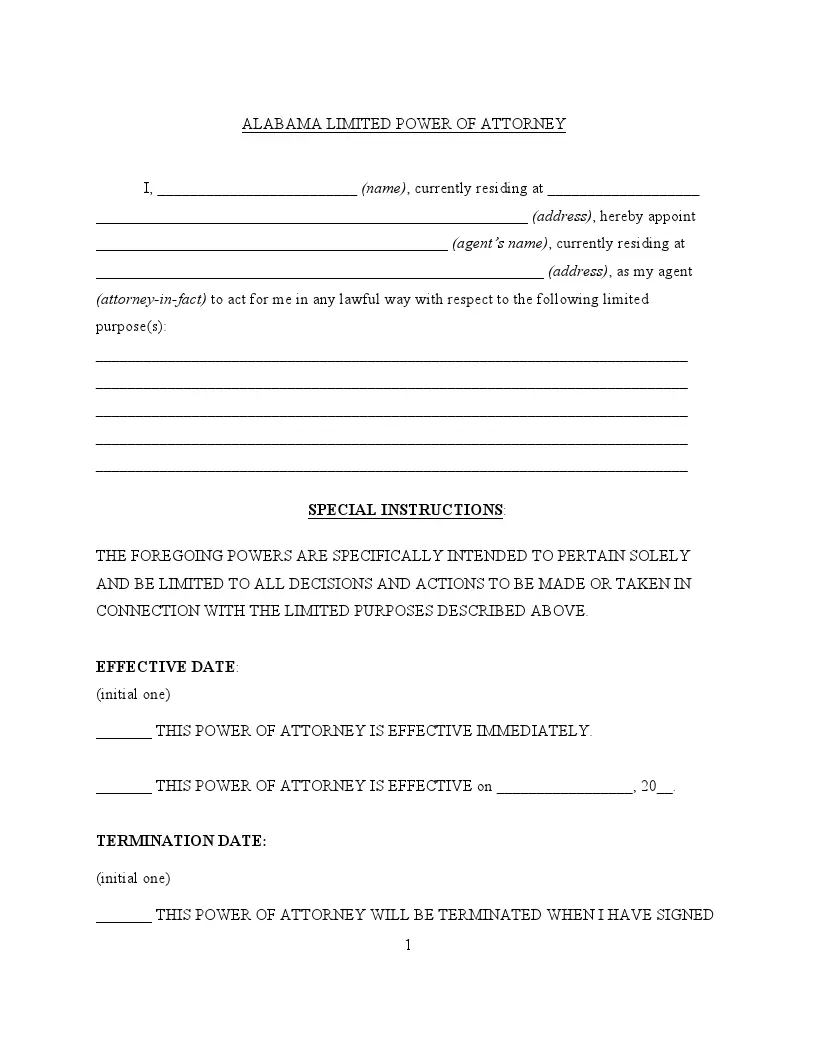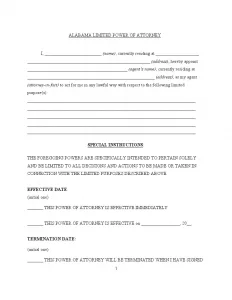Alabama Limited Power of Attorney Form
The Alabama limited power of attorney is a legal document that allows a person (the principal) to designate another person (the agent) to perform specific actions or handle certain tasks on their behalf. Unlike a general power of attorney, which grants broad powers, a limited power of attorney specifies exactly what powers the agent can exercise. It can include tasks like selling property, managing financial transactions, or handling business affairs, but only within the limits set by the principal.
The document must clearly outline the scope of authority granted to the agent, including any restrictions or conditions. It should also specify when the agent’s powers begin and end, whether on a fixed date or upon completing specific actions.
Follow this link to see all the Alabama power of attorney forms you can fill out.

Build Your Document
Answer a few simple questions to make your document in minutes
Save and Print
Save progress and finish on any device, download and print anytime
Sign and Use
Your valid, lawyer-approved document is ready
The signing requirements and legal provisions for a limited POA are governed by the Alabama Uniform Power of Attorney Act, specifically under Chapter 1A. According to the statutes (Ala.Code 1975 § 26-1A-201), a limited power of attorney allows an agent to act on behalf of the principal within the scope of authority explicitly granted in the agreement. It means that the principal must clearly outline the specific powers that are being transferred.
As stipulated by Ala. Code 1975 § 26-1A-105, the document must be signed by the principal and authenticated by a notary public to be legally valid. Here is a list of powers that might typically be granted in a limited power of attorney:
- Management of financial transactions.
- Real estate sales or purchases.
- Handling specific legal claims.
This type of power of attorney is helpful for principals who need someone to act on their behalf in specific situations without giving them broader powers over their affairs.
Alabama Limited Power of Attorney Form Details
| Document Name | Alabama Limited Power of Attorney Form |
| Other Name | Alabama Special Power of Attorney |
| Relevant Laws | Code of Alabama, Section 26-1A-201 |
| Avg. Time to Fill Out | 8 minutes |
| # of Fillable Fields | 32 |
| Available Formats | Adobe PDF |
Filling Out Alabama Limited POA
Filling out the Alabama limited power of attorney is a structured process that details specific powers and guidelines for an appointed agent. This guide will help you complete the form accurately.
1. Enter the Principal’s Information
Start by entering your full name and current residential address, as indicated at the beginning of the form. This identifies you as the principal authorizing another person to act on your behalf.
2. Designate Your Agent
Fill in the name and current address of the person you appoint as your agent. This individual will be granted the authority to act on your behalf within the limits specified in this document.
3. Define the Powers Granted
Specify the exact powers you are granting to your agent. Be clear and precise in this section to avoid ambiguity regarding your agent’s roles and limitations.
4. Set the Effective Date
You must decide when this power of attorney will come into effect. You can choose whether it will be effective immediately or begin on a specified future date. Initial next to your choice.
5. Determine the Termination Date
Specify how and when the power of attorney will terminate. Options include a specific date upon your written revocation or your incapacitation. Initial next to the chosen condition.
6. Appoint a Successor Agent
If you wish, appoint a successor agent by entering their name and address. This person will take over if your primary agent is unable to serve.
7. Sign and Date the Document
On the designated line, sign your name and print it below to execute the document formally. Ensure you do this in the presence of a notary public.
8. Notarization
The form must be notarized to be legally valid. The notary public will verify your identity and witness your signature, then complete the acknowledgment section of the form.
After notarization, keep the original document safe and provide copies to your agent and any institutions or individuals needing to recognize your agent’s authority.
